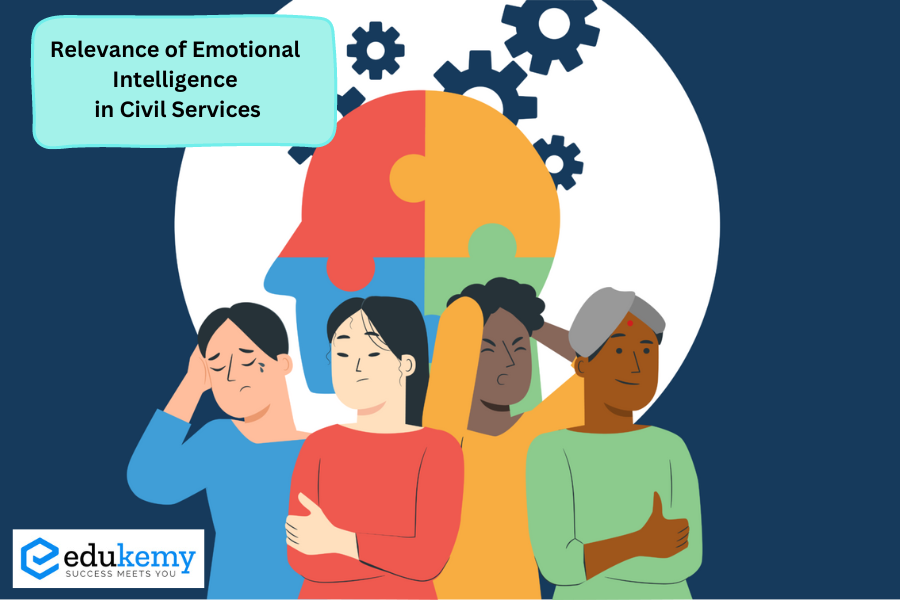
Emotional intelligence (EI) is highly relevant in civil services for several reasons:
Contents
- 0.1 Effective Leadership:
- 0.2 Conflict Resolution:
- 0.3 Stress Management:
- 0.4 Effective Communication:
- 0.5 Public Relations:
- 0.6 Adaptability and Innovation:
- 1 FAQs
- 1.1 Q: What is emotional intelligence, and why is it important in civil services?
- 1.2 Q: How can emotional intelligence be developed and improved among civil servants?
- 1.3 Q: What role does emotional intelligence play in leadership within civil services?
- 1.4 Q: How does emotional intelligence contribute to better public relations in civil services?
- 1.5 Q: Can emotional intelligence training be integrated into existing civil service training programs?
- 2 In case you still have your doubts, contact us on 9811333901.
Effective Leadership:
Civil servants often find themselves in leadership positions where they need to manage teams, negotiate with stakeholders, and make tough decisions. High emotional intelligence enables leaders to understand and manage their own emotions as well as the emotions of others, fostering better relationships and decision-making.
Conflict Resolution:
Civil servants frequently encounter conflicts, whether it’s between colleagues, within communities, or among different governmental departments. EI helps in navigating these conflicts by fostering empathy, active listening, and collaboration, leading to more constructive resolutions.
Stress Management:
Civil services can be highly demanding and stressful due to the nature of the work, bureaucratic processes, and public scrutiny. Emotional intelligence equips individuals with the ability to cope with stress effectively, maintain resilience, and prevent burnout.
Effective Communication:
Communication skills are vital in civil services for conveying information, policies, and decisions to various stakeholders, including the public, government officials, and other agencies. Emotional intelligence enhances communication by enabling individuals to understand the emotions underlying messages, tailor communication styles accordingly, and build rapport.
Public Relations:
Civil servants often interact with the public, addressing their concerns, complaints, and inquiries. Emotional intelligence helps in managing these interactions with empathy, patience, and professionalism, which is crucial for maintaining public trust and satisfaction.
Adaptability and Innovation:
In a rapidly changing environment, civil servants need to be adaptable and innovative in finding solutions to emerging challenges. Emotional intelligence fosters open-mindedness, creativity, and flexibility, enabling individuals to embrace change and think outside the box.
FAQs
Q: What is emotional intelligence, and why is it important in civil services?
Emotional intelligence refers to the ability to recognize, understand, and manage one’s own emotions as well as the emotions of others. In civil services, it is crucial because it enhances leadership effectiveness, promotes better communication and conflict resolution, reduces stress, and improves overall job performance.
Q: How can emotional intelligence be developed and improved among civil servants?
Emotional intelligence can be developed through self-awareness exercises, such as journaling and reflection, as well as through training programs that focus on empathy, active listening, and interpersonal skills. Additionally, practicing mindfulness techniques and seeking feedback from peers and supervisors can help individuals improve their emotional intelligence.
Q: What role does emotional intelligence play in leadership within civil services?
Emotional intelligence is essential for effective leadership in civil services as it enables leaders to inspire and motivate their teams, build trust and rapport with stakeholders, navigate conflicts diplomatically, and make sound decisions even in high-pressure situations. Leaders with high emotional intelligence are better equipped to handle the complexities of governance and foster a positive organizational culture.
Q: How does emotional intelligence contribute to better public relations in civil services?
Emotional intelligence enhances public relations in civil services by enabling civil servants to empathize with the concerns and needs of the public, communicate effectively with diverse audiences, manage challenging interactions with tact and professionalism, and build long-term trust and credibility. Civil servants with high emotional intelligence are better equipped to address public inquiries, complaints, and feedback in a constructive manner.
Q: Can emotional intelligence training be integrated into existing civil service training programs?
Yes, emotional intelligence training can and should be integrated into existing civil service training programs to enhance the overall competency and effectiveness of civil servants. By incorporating modules on self-awareness, empathy, communication, conflict resolution, and stress management, organizations can equip civil servants with the necessary skills to excel in their roles and serve the public more effectively.
In case you still have your doubts, contact us on 9811333901.
For UPSC Prelims Resources, Click here
For Daily Updates and Study Material:
Join our Telegram Channel – Edukemy for IAS
- 1. Learn through Videos – here
- 2. Be Exam Ready by Practicing Daily MCQs – here
- 3. Daily Newsletter – Get all your Current Affairs Covered – here
- 4. Mains Answer Writing Practice – here

